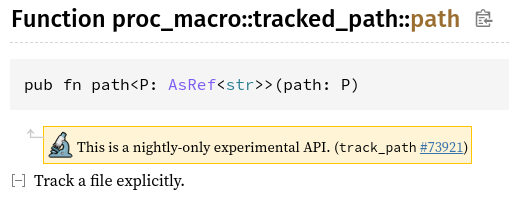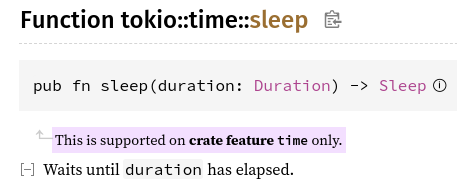Way back in mid-2017 I created a crate called include_dir with
a single goal in mind - give users an include_dir!() macro that lets them
embed an entire directory in their binary.
By most metrics, we’ve been doing phenomenally well. The crate has received a fair amount of engagement on GitHub via pull requests and issues, and it has had over 1 million downloads and 127 direct dependents published to crates.io alone.
However, due to work commitments and low motivation, the include_dir crate
hasn’t received as much love as I’d like to give it over the last year or so 😞
I recently1, I found myself with a free weekend and a desire to be
productive, so I thought I’d take advantage of how Rust has evolved since 2017
and work through some of include_dir’s backlog.
The code written in this article is available on GitHub. Feel free to browse through and steal code or inspiration.
If you found this useful or spotted a bug in the article, let me know on the blog’s issue tracker!
Project Goals and Values Link to heading
I’ve written a fair amount of Rust code in my time and reviewed a lot more, and that has left me with some strong opinions about authoring crates:
- Don’t pull in unnecessary dependencies
- Make the happy path simple and intuitive
- Don’t make me pay for what I don’t use
- Unless you have a good reason, cross-compilation should Just Work without any extra configuration or fiddling
In the past, several people have asked if I can add a level of configurability
to the include_dir!() macro (e.g. excluding files or using a different base
directory when resolving paths), but most of these proposals involve creating
multiple macros or overloading the existing include_dir!() macro with an
optional config argument. According to rule 2, these proposals would be
non-starters because there are now multiple ways of doing things.
Points 1, 3, and 4 all relate to how compilation and where the crate can be used.
At work, my main project has a component that is compiled to WebAssembly and
deliberately doesn’t use the standard library (i.e. it is a no_std crate). We
have a second component that depends on TensorFlow and needs to be
cross-compiled to Windows/Linux/MacOS desktops, mobile devices, and the web.
Targeting such a large variety of platforms makes you appreciate libraries that
are platform-agnostic where cross-compiling Just Works, and you really
notice when they don’t. That second component reminded me just how lucky Rust
is to have cargo instead of the mish-mash of Bazel, CMake, Makefiles, and
random shell scripts.
Migrating to Newer Language Features Link to heading
Function-like Procedural Macros Link to heading
Procedural macros have evolved a lot since include_dir was first created and
as of Rust 1.45 we no longer need hacks like the proc-macro-hack crate
to use them in expressions.
Most notably, this lets the include_dir!() macro parse its input directly as
a string literal instead of needing to go through a custom derive. It sounds
boring, but this means we get to drop the syn dependency altogether and reduce
our compile times quite a bit.
Once the proc_macro_quote feature is stabilised we should be
able to drop our macro’s final two dependencies, quote and proc_macro2, and
just use the proc_macro crate directly.
Either way, dropping dependencies without losing functionality is nice.
Const Functions Link to heading
In Rust 1.46 (September 2020), a really cool feature was stabilised - the
ability to write functions which can be evaluated at compile time and in a
const context.
Previously, the include_dir!() macro would take an expression like
include_dir!("./assets/") and expand it to an object literal that looks
something like this:
static ASSETS: Dir<'_> = Dir {
path: "",
children: &[
DirEntry::File(File {
path: "index.html",
contents: b"<html>..."
}),
DirEntry::Dir(Dir {
path: "img",
children: &[
...
]
}),
]
};
On its own this seems rather innocuous, but because macros are evaluated within
the context of wherever they are called and because we are setting fields
directly, it means everything needs to be publicly accessible otherwise your
macro runs into " field path of struct Dir is private" errors.
However, making all your fields public means it is possible for anyone to use them and due to Hyrum’s Law we know someone will invariably depend on these internals. Therefore, if we ever want to restructure things or change assumptions made about a semantically-internal-but-technically-public field we’ll have people complaining about broken builds.

(obligatory XKCD reference)
As a hack workaround, we can use the #[doc(hidden)] attribute to hide our
internal fields from a crate’s documentation. That means people can still
technically access them, but only if they have deliberately read the source code
and opted in to accessing those hidden fields anyway.
Now, with the ability to call functions when initializing static or
const variables, we can just give Dir and File constructors while keeping
internal details inaccessible from the outside.
Environment Variable Interpolation Link to heading
After using include_dir in the wild for a while, we found a couple of
limitations with we convert the provided string into a path.
The biggest issue was that Rust doesn’t guarantee which folder a procedural
macro will be executed from, meaning all relative paths would be implicitly
resolved relative to $CARGO_MANIFEST_DIR.
That meant your src/lib.rs file might look like this…
// src/lib.rs
static SRC_DIR: Dir<'_> = include_dir!(".");
… and looking up lib.rs would fail at runtime because the actual directory
structure is something completely different.
.
├── Cargo.lock
├── Cargo.toml
├── README.md
└── src
└── lib.rs
Users also wanted to resolve paths relative to different directories, namely
$OUT_DIR, and were proposing alternate macros like
include_dir_from_out_dir!() or adding configuration arguments to
include_dir!().
However, both of those proposals complicate the crate by creating multiple ways to accomplish similar things, which clashes with my Make the happy path simple and intuitive goal.
I ended up choosing an alternative solution that should be familiar to anyone that has used a terminal before - environment variable interpolation.
The idea is you can write include_dir!("$CARGO_MANIFEST_DIR/src/") and avoid
all ambiguity. It also solves the $OUT_DIR problem quite elegantly if I do
say so myself.
File Metadata Link to heading
Some people were asking if we could record filesystem metadata when embedding a directory tree.
Adding hidden fields and extra methods to a type doesn’t have much of an impact
on the way people use the include_dir!() macro, but because it adds a level of
non-determinism to builds I opted to put this behind its own feature flag.
There are some technical difficulties in that std::time::SystemTime doesn’t
have any public const fn constructors so we end up storing time as a duration
since the UNIX_EPOCH, but other than that it’s pretty straightforward.
Nightly Features Link to heading
As well as all the normal functionality, we’ve created an opt-in feature flag
which lets people use nightly-only features to improve their developer
experience.
Better Dependency Tracking Link to heading
Something I like about build scripts is that you can tell cargo to only re-run
when a particular environment variable or file has changed. This helps cut down
on unnecessary recompiles by giving tools like cargo and rust-analyzer a
better idea of your dependencies, letting them improve caching accuracy.
Procedural macros have similar functionality that is currently unstable, namely…
- the
tracked_envfeature which enables theproc_macro::tracked_env::var()function for reading environment variables, and - the
tracked_pathfeature which enables theproc_macro::tracked_path::path()function for telling the compiler that this build script depends on a specific path
Personally, I would prefer if the tracked_path feature exposed wrappers around
the std::fs module (e.g. std::fs::read_dir() and
std::fs::read_to_string()) because it means using a resource automatically
notifies the compiler of the dependency instead of needing to “remember” to
call proc_macro::tracked_path::path(), but it’s a start.
My hope is that down the track, rust-analyzer will be able to hook into these
APIs and avoid unnecessarily reading a directory tree into memory and compiling
it into Rust constants (a fairly memory-intensive task).
Document Feature-gated APIs Link to heading
The tool used to generate pretty HTML documentation for Rust code, rustdoc,
has a feature which lets users see when particular functions and types are
feature-gated.
If you have ever browsed the standard library’s API docs, you will be familiar
with the This is a nightly-only experimental API annotations that guard
unstable features.

Unstable feature annotation used in proc_macro::tracked_path::path()
By adding #![feature(doc_cfg)] to the top of your lib.rs, any crate can get
similar annotations for code guarded by #[cfg(...)].

Annotation on the Tokio crate’s "time" feature
In version 0.7 of the include_dir crate I’ve enabled this annotation whenever
the nightly feature flag is enabled.
Most end users won’t actually use this directly, instead they’ll get the annotations for free whenever they visit the online API docs.
Conclusion Link to heading
This release introduces several big improvements, but more than that I think it’s helped me solidify my goals and values for the project.
Unfortunately, that means I will probably be closing several PRs and issues as “won’t fix”. I’m apologising ahead of time to those affected because I know what it’s like to really want a feature only to have the project maintainer reject it, however I think it’s important in the overall goal of making this crate as nice to use as possible.
In my opinion, the best thing a person can say about a library or product is that it Just Works, and I’m hoping this 0.7 release will bring us one step closer to that goal.
I’d also like to use this blog post as an opportunity to ask for reviews. It
would be really nice to have extra eyes on this crate, and using a public review
system like CREV would give people more confidence that they can use
include_dir in production. You can check out their Getting Started
guide for more.
-
Well… “recently” when I started writing this post. It’s been about 2 months since then 😅 ↩︎